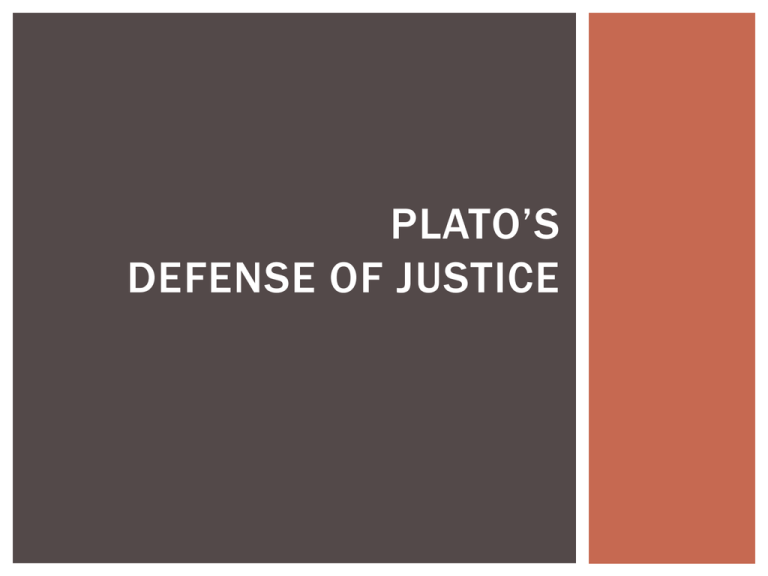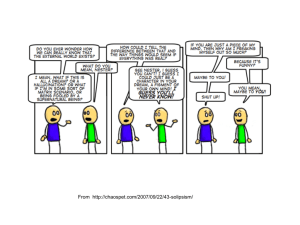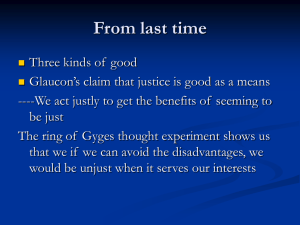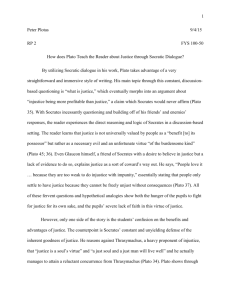Plato*s defense of justice
advertisement

PLATO’S DEFENSE OF JUSTICE ARISTOTLE, MAGNA MORALIA I.1 “[Next] came Socrates, who spoke better and further about this subject, but even he was not successful. For he used to make the virtues sciences, and this is impossible. For the sciences all involve reason, and reason is to be found in the intellectual part of the soul. So that all the virtues, according to him, are to be found in the rational part of the soul. The result is that in making the virtues sciences he is doing away with the non rational part of the soul, and is thereby doing away also both with passion and character; so that he has not been successful in this respect in his treatment of virtues. After this Plato divided the soul into the rational and the non -rational part—and in this he was right—assigning appropriate excellences to each. So far so good. But after this he went astray …” THE STRUCTURE OF SOCRATES’ MORAL THEORY (a) Socrates’ thesis about desire (b) denial of weakness of will (C) virtue as knowledge PLATO’S STRATEGY IN BOOK IV (1) Show that Socrates’ thesis about desire is false via counterexamples. (2) Move from these counterexamples to a view of the mind that acknowledges enough psychical complexity to accommodate the possibility of weakness. (3) Provide a novel approach to virtue that improves on the idea that virtue is knowledge. (4) Provide a novel defense of the just life as preferable to the unjust life. THE COUNTEREXAMPLES Most of Plato’s counterexamples to Socrates’ thesis about desire all involve cases of mental conflict. Ultimately, we will look at six alleged counterexamples: Book IV 1. The thirsty non-drinker 2. Odysseus 3. Young children & non-human animals Book X 1. Partially deceptive illusions 2. The restrained mourner Euripides 1. Medea THE TRIPARTITE SOUL REASON APPETITE SPIRIT THE TRIPARTITE SOUL REASON thirsty non-drinker APPETITE SPIRIT THE THIRST Y NON-DRINKER Plato does not tell us much about his thirsty non -drinker, but he takes it to be a powerful objection to the Socratic theory. Activity instructions . Fill out the details regarding the circumstances of the thirst non -drinker in such a way that the case raises doubts about Socrates’ thesis about desire. Why, in the circumstances you have described, does it seem wrong to think of the thirst as a function of the non-drinker’s values? How might Socrates respond to the alleged counterexample? THE THIRST Y NON-DRINKER “Doesn’t that which forbids in such cases come into play —if it comes into play at all—as a result of rational calculation, while what drives and drags them to drink is a result of af fections and diseases?” (439c9-d2) Our appetitive desires are products of physiological changes — bodily af fections and diseases —whereas our rational desires are due to reasoning/calculating. Rational desires are acquired through deliberation aimed at attaining the best available option. By contrast, we do not have appetites for drink, food, or sex because these things are taken to be good . Indeed, in having appetites, we do not desire food, drink, and sex as good things at all. IRRATIONAL VS. NON-RATIONAL The want/desire opposed to one’s appetite can be praised as rational or condemned as irrational, but no one counts as reasonable or unreasonable in virtue of being thirsty. What accounts for this dif ference? Rational/irrational. In rejecting one’s appetite for drink, one has a goal relative to which this inclination to refrain from drinking can be assessed, namely, the goal of attaining the best available outcome. One can pursue this end by means that are generally ef fective or one can do so by means that are generally inef fective. In the former case the resulting want is rational; in the latter the desire is irrational. Non-rational. Our appetites come about through physiological changes, not through pursuit of any goals. Accordingly, they cannot be similarly assessed. WHAT WOULD SOCRATES SAY? If Socrates wants to hold on to his thesis about desire, he should insist that thirst is a feeling rather than a desire. In feeling thirst we are sensing a state of the body. Since the state is uncomfortable/unpleasant, we come to desire drink as a means to the goal of removing the unpleasant condition of the body. Appetitive desires are not a direct product of physiological changes. Rather, these changes bring about sensations or feelings. Our desires arise through reflection on how to attain the best outcome (among available options). THE TRIPARTITE SOUL REASON thirsty non-drinker APPETITE Odysseus/children/animals SPIRIT THE CASE OF ODYSSEUS How might Odysseus’ anger at the maidservants make trouble for Socrates’ thesis about desire? THE RECALCITRANCE OF ANGER Even when one knows that everything speaks against retaliation, the desire for retaliation can linger. Does this consideration suggest that anger (understood as a desire for retaliation) is an independent source of motivation, one distinct from reason? YOUNG CHILDREN & ANIMALS “Even in small children, one can see that they are full of spirit right from birth, while as far as rational calculation is concerned, some never seem to get a share of it, while the majority do so quite late… And in animals too one can see [the same].” What is Plato’s point in this passage about spirit vs. reason? THE CASE OF MEDEA Epictetus (a Socratic/Stoic) and Galen (a Platonist) disagree about how to interpret Medea’s internal struggle. Epictetus: In her struggle to do the right thing, Medea determines that gratifying her feelings of anger & getting revenge is best. Galen: After a struggle between passion and better judgment, she knowingly acts against her better judgment (weakness). Does either reading of the text seem more natural? How do these readings af fect our sympathy for the character, Medea? Which view of anger (the Socratic or Platonic) do you fine more attractive? THE TRIPARTITE SOUL REASON thirsty non-drinker Odysseus/children/animals (Medea) APPETITE SPIRIT Leontius THE CASE OF LEONTIUS “Leontius, the son of Aglaion, was going up from the Piraeus along the outside of the North Wall when he saw some corpses lying at the executioner’s feet. He had an appetite to look at them but at the same time he was disgusted and turned away. For a time he struggled with himself and covered his face, but, finally, overpowered by the appetite, he pushed his eyes wide open and rushed towards the corpses, saying, ‘look for yourselves, you evil wretches, take your fill of the beautiful sight!’” What sort of desire do you think Leontius is struggling with? How is this mental conflict supposed to show that appetite is distinct from spirit? THE CASE OF LEONTIUS Leontius is overcome by sexual appetite and acts against his better judgment. He becomes ashamed & angry with himself. Plato makes room for the possibility of weakness by allowing that we sometimes desire more what we value less. That is not to say that we always act in accord with our strongest desire. Plato will acknowledge a role of self -control. THE TRIPARTITE SOUL REASON thirsty non-drinker Odysseus/children/animals (Medea) APPETITE SPIRIT Leontius WHERE WE ARE SO FAR (a) Socrates’ thesis about desire (b) denial of weakness of will (C) virtue as knowledge THE NATURE OF COURAGE Plato tells us that a person is courageous in virtue of their spirited part of the soul: “And it is because of the spirited part, I suppose, that we call a single individual courageous, namely, when it preserves through pains and pleasures the declarations of reason about what is to be feared and what isn’t.” (442bc) One plausible reading: Plato allows for the possibility of exaggerated fear. While having the right judgment is required for courage, it isn’t enough by itself. One also needs self-control to endure in the face of not -so-rational impulses. THE NATURE OF TEMPERANCE "Moderation is surely a kind of order, the mastery of certain kinds of pleasures and desires. People indicate as much when they use the phrase “self-control”… Yet isn’t the expression “self-control” ridiculous? The stronger self that does the controlling is the same as the weaker self that gets controlled, so that only one person is referred to in all such expressions … Nonetheless, the expression is apparently trying to indicate that, in the soul of that very person, there is a better part and a worse one and that, whenever the naturally better part is in control of the worse, this is expressed by saying that the person is self -controlled or master of himself . At any rate, one praises someone by calling him self -controlled. But when, on the other hand, the smaller and better part is overpowered by the larger, because of bad upbringing or bad company, this is called self -defeated or licentious and is a reproach.” (431ab) THE NATURE OF TEMPERANCE According to Plato, temperance is a kind of harmony between the parts of the soul, a lack of conflict among the parts due to an agreement about which part should rule. He explicitly mentions a role for self-control. Weakness of will can occur because one’s rational part can be overpowered by appetite. VIRTUE AS TEACHABLE THROUGH TRAINING “And isn’t it, as we were saying, a mixture of music and poetry, on the one hand, and physical training, on the other, that makes the two parts [reason & spirit] harmonious, stretching and nurturing the rational part with fine words and learning, relaxing the other part through soothing stories, and making it gentle by means of harmony and rhythm?... And these two, having been nurtured in this way, and having truly learned their own roles and been educated in them, will govern the appetitive part, which is the largest part in each person’s soul and is by nature most insatiable for money. They’ll watch over it to see that it isn’t filled with the so-called pleasures of the body and that it doesn’t become so big and strong that it no longer does its own work but attempts to enslave and rule over the classes it isn’t fitted to rule, thereby overturning everyone’s whole life.” (442ab) THE NATURE OF JUSTICE Being just is a matter of each part of the soul doing its own proper work: reason → to rule spirit → to serve as auxiliary appetite → ? THE NATURE OF VIRTUE? What is virtue? Courage, temperance, and justice all require wisdom (about good & evil). They also require training of the non -rational parts. Plausibly Plato is thinking of virtue as something like: wisdom + self-control. THE UNIT Y OF VIRTUE? Can someone be wise but intemperate or cowardly? This question is not explicitly addressed. It might seem the answer is obviously YES, but the issue is complex. The non rational parts have cognitive states as well as motivational states. If the non-rational parts are out of control, the individual is likely to have many false judgments in addition to misguided urges. DEFENSE OF THE JUST LIFE: BOOK IV Just as body parts have functions, so too do psychical parts. Failure to perform a bodily function just is lack of health, and same goes for psychical function. And since health is in our interest, it is in our interest to be just! DEFENSE OF THE JUST LIFE: BOOK IX (588C-589A) “…fashion a single kind of multicolored beast with a ring of many heads that it can grow and change at will —some from gentle, some from savage animals… Then fashion one other kind, that of a lion, and another of a human being. But make the first much the largest and the other second to it in size… Now join the three of them into one, so that they somehow grow together naturally… Then, fashion around them the image of one of them, that of a human being so that anyone who sees only the outer covering…will think it’s a single creature, a human being… Then, if someone maintains that injustice profits this human being and that doing just things brings no advantage,…he is simply saying that it is beneficial for him, first, to feed the multiform beast well and make it strong, and also the lion…; second, to starve and weaken the human being within, so that he is dragged along wherever either of the other two leads; and, third, to leave the parts to bite and kill one another rather than accustoming them to each other and making them friendly.” DEFENSE OF THE JUST LIFE: BOOK IX One’s true self (the person) is one’s values/convictions. To live an unjust life is to let the self be crushed and overrun by things external to the self. A WORRY? What about an unjust individual who is disciplined & self controlled? Why can’t a person of this sort be at least moderately happy —at any rate happier than the just person sketched in the comparison of lives?




